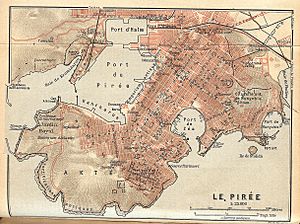Hippodamus of Miletus facts for kids
Hippodamus of Miletus (Greek: Ἱπποδάμος ὁ Μιλήσιος; 498 – 408 BC) was an ancient Greek architect, city planner, doctor, mathematician, weather expert, and philosopher. He is often called "the father of European urban planning" because he created the "Hippodamian Plan," which is a grid plan for city layouts.
Hippodamus was born in Miletus and lived during the 5th century BC, a time when Ancient Greece was flourishing. His father was Euryphon. The famous philosopher Aristotle said that Hippodamus was the first person to write about how governments should work, even though he didn't have much practical experience in politics himself.
His city plans were known for being very organized and regular. This was a big change from most cities back then, which were often confusing and messy, even places like Athens. Hippodamus believed that a city's layout could show and support a logical way of organizing society.
Contents
Who Was Hippodamus?
Many ancient writers mentioned Hippodamus in their works, including Aristotle, Stobaeus, Strabo, Hesychius, and Photius.
He seemed to enjoy being noticed. Aristotle wrote in his book Politics that some people thought Hippodamus went a bit too far with his long hair, fancy jewelry, and wearing the same simple, warm clothes all year round.
What Did He Achieve?

Designing Ideal Cities
According to Aristotle, Hippodamus was a pioneer in urban planning. He designed an ideal city meant for 10,000 free men. If you included women, children, and slaves, the total population would be around 50,000 people. He thought about how cities worked and how they connected to the government.
He divided the citizens into three groups: soldiers, artisans (skilled workers), and 'husbandmen' (farmers). The land was also divided into three parts: sacred (for temples), public (for everyone), and private (for individuals).
Aristotle, however, had some concerns about Hippodamus's "Best State." He worried that if only one group, like the soldiers, had all the weapons, they might unfairly control the farmers and workers. Aristotle believed that in a good society, every citizen should be able to make laws, carry weapons, and work.
Master City Planner
Aristotle also said that Hippodamus was the first city planner to really focus on organizing cities properly. He designed Piraeus, which is the port of Athens, for the leader Pericles. Piraeus had wide streets that spread out from a central market area called the Agora. This area was often called the Hippodameia in his honor.
Hippodamus also helped plan the new city of Rhodes in 408 BC, making it look like a theater. In 440 BC, he joined Athenian settlers and planned the new city of Thurium (later Thurii) in Magna Graecia. This city had streets that crossed at right angles, which is why he is sometimes called Hippodamus of Thurium. His planning ideas were later used in many important cities, such as Halicarnassus, Alexandria, and Antioch.
The grid plans he created had many wide, straight streets that crossed each other at right angles. In his hometown of Miletus, you can see an early example of Hippodamus's plan. What's really impressive about his plan for Miletus is a large central area that he kept empty. He predicted this area would become the "Agora," which was the main center for both the city and its people.
His Ideas on City Planning
Hippodamus is believed to have written a study called Urban Planning Study for Piraeus in 451 BC. This work set the standards for city planning at that time and was used in many cities during the classical period. According to this study, neighborhoods were built with blocks of about 2,400 square meters. These blocks had small groups of two-story houses. The houses were lined up with walls separating them, and their main fronts faced south.
Philosophy
Hippodamus had some of the earliest ideas about patent law. He suggested that society should reward people who create things that are useful for everyone.
Aristotle, however, thought that rewarding people for doing good might lead them to do good things just for the reward, rather than for the benefit of the state. He worried that people might propose ideas that weaken the state if they were only seeking personal rewards. Aristotle also said that while new ideas are great for arts and sciences, changing laws too easily is not good. Laws get their power from people following them over time, and changing them often can make them seem less important.
Hippodamus didn't seem to be directly involved in politics, but he wrote several works about the state. These included Περί Πολιτείας (On the State), Περί Ευδαιμονίας (On Happiness), and Πυθαγορίζουσαι Θεωρίαι (Pythagoras Theorems).
See also
 In Spanish: Hipodamo de Mileto para niños
In Spanish: Hipodamo de Mileto para niños
 | Janet Taylor Pickett |
 | Synthia Saint James |
 | Howardena Pindell |
 | Faith Ringgold |

